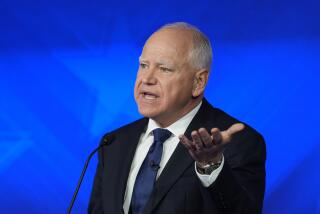China Visit’s Gains Subject to Inflation
- Share via
SHANGHAI — The first American president ever to travel overseas while in office was Theodore Roosevelt. In 1906, he departed from the United States to inspect the construction of the Panama Canal.
“Teddy slogged everywhere and saw everything,” wrote historian Walter McDougall of that trip, noting that Roosevelt even mounted the controls of a steam shovel in a demonstration of America’s newfound ambitions and power.
Now, nearly a century later, another traveling American president is trying, at least figuratively, to make the earth move. This time it is Bill Clinton, seemingly trying to construct democratic ideals and values in China.
Clinton’s tool is not the steam shovel but the microphone. Yet his task is in its way no less ambitious than Roosevelt’s, and perhaps considerably more so. Over the centuries, Chinese culture has successfully resisted Western, Japanese and Soviet efforts to mold it in the image of others.
Is Clinton succeeding?
To listen to the almost-giddy accounts of Clinton administration officials, the American president’s first few days here have marked a fundamental turning point for China, one of the world’s oldest civilizations.
White House Press Secretary Mike McCurry spoke of “the truly historic things we’ve seen” during Clinton’s trip--a remarkable assertion in a country that has seen a lot of history.
What McCurry meant was the fact that the president has managed to utter, and get broadcast on Chinese television, some carefully chosen phrases in support of political freedom and the Tiananmen Square demonstrations for democracy in 1989.
“I believe, and the American people believe, that the use of force and the tragic loss of life were wrong,” Clinton told Chinese President Jiang Zemin in a televised news conference last Saturday.
Clinton deserves credit for getting these views onto the Chinese airwaves. “It was especially important for the people to hear that,” says Bao Tong, the former senior Communist Party official who was jailed for seven years for opposing the 1989 crackdown.
Nevertheless, what Clinton has done in China should be kept in perspective. It is a uniquely American conceit to suggest that a couple of television appearances can, by themselves, change a political system.
The president and the huge entourage he brought with him to China (a delegation big enough, it sometimes seems, to dig another Panama Canal) are under extraordinary pressure to magnify the results of their trip. On foreign policy, China is emerging as the principal issue between the Republican Party and Clinton.
And so in China, Clinton’s team is portraying even marginal successes as groundbreaking.
Earlier this year, administration officials hoped that during the current visit, China would join the Missile Technology Control Regime, which limits the spread of missiles. China refused. Instead, administration officials won last weekend a Chinese promise that it has “begun to actively study” joining the missile regime.
This is far less than the administration originally sought--and it probably sets the stage for several new rounds of bargaining before anything is nailed down. Yet Deputy Assistant Secretary of State Susan Shirk told reporters these noncommittal words by China were “highly, highly significant” and “a major accomplishment of the summit.”
Meanwhile, China is getting much of what it wants from Clinton. In the broadest sense, what the Communist Party leadership obtains from this trip is the breathing space it needs in order to concentrate on domestic economic reforms.
Jiang can rest more assured now that America will not make too much trouble for China. Clinton is further sanctifying the authority of the Chinese Communist Party over the mainland--and in the future over Taiwan, too. And he is putting China back at the center of U.S. policy in Asia.
Not bad for the price of letting Clinton say a few words on Chinese television.
Indeed, it has often seemed as though Clinton’s public appearances in China are aimed not so much at Chinese audiences, but at American ones. The idea is to dispel overly negative perceptions of China back home. “I hope that my trip will help to show a full and balanced picture of modern China to the United States,” the president said this week.
Clinton’s remarks on Chinese TV aren’t inherently threatening to the regime. China isn’t lifting its controls on political dissent. And Clinton’s rhetorical flourishes in China still fall short of what other American presidents have done in other Communist countries.
In 1988, President Reagan was able to meet personally with a group of Soviet dissidents on a visit to Moscow. China isn’t nearly as politically open now as the Soviet Union was back then. Administration officials have rejected all suggestions that Clinton meet with Chinese dissenters on this trip, saying they feared that anyone they met with might be thrown into jail.
China isn’t altered as easily as American presidents often claim. In 1972, during President Nixon’s historic trip, he sought to flatter Chairman Mao Tse-tung by telling him he had transformed China. But Mao demurred. “I have not been able to change it,” replied Mao. “I have only been able to change a few places in the vicinity of Peking.”
At least for that moment, Mao was less grandiose about changing China than the Clinton administration has been this week.
Jim Mann’s column appears in this space every Wednesday.
More to Read
Sign up for Essential California
The most important California stories and recommendations in your inbox every morning.
You may occasionally receive promotional content from the Los Angeles Times.













